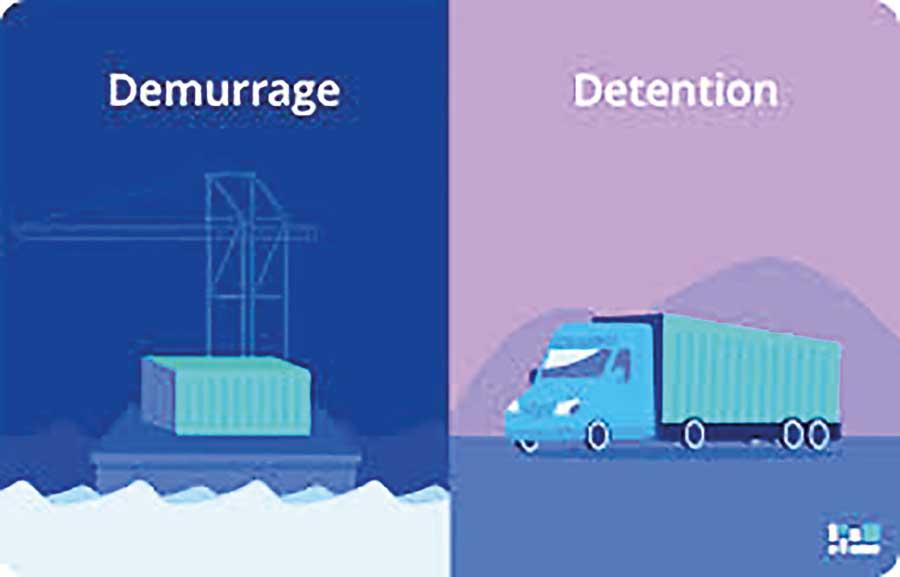Reply To:
Name - Reply Comment

Even though there are distinct differences between demurrage, detention and port charges, many are still oblivious to these differences and make fundamental mistakes when goods are shipped without proper understanding of the cost and liabilities in international trade.
when goods are shipped without proper understanding of the cost and liabilities in international trade.
Demurrage and detention in context of container shipments
When a shipper is in the process of shipping a container from point A to point B in international trade, there are multiple cost components, all of which must be covered either by the seller or buyer. The demurrage, detention and port charges are just some of these costs that may be applicable in a shipment.
When it comes to international trade, most of the buyers and sellers use Incoterms to decide on what each other’s responsibilities and liabilities are in terms of the business, especially related to costs.
However, they pay little attention to detail when selecting the terms and end up in disputes or massive excess costs. The standard port charges may be unavoidable. The demurrage and detention charges on the other hand are totally avoidable charges but in many instances, mishandling, misunderstanding and not following the proper protocols and terms, these charges occur, leading to confusion and frustration.
When these charges do occur, they create quite a financial impact on the whole business and sometimes these costs could be so prohibitive that some customers abandon their cargo at their destination.
Generally, there is very little room to maneuver in terms of additional and unbudgeted costs incurred on a shipment and therefore in their own interest it is important that the shippers (buyers and sellers) and freight forwarders take necessary precautions to ensure that all known costs relating to the business are discussed and finalised before the shipment commences, rather than just inserting an Incoterm in a sales contract.
Demurrage relates to cargo (while cargo is in container)
Globally, the demurrage charges can be of two types: one levied by the shipping line and the other by the terminal or the port operator. In the case of a shipping line, charging to the importer, where they have not taken delivery of the full container and move it out of the port/terminal area for unpacking within the allowed line free days.
In some cases, the port may charge demurrage separately for holding its cargo within a certain premises, the charges may differ from port to port and case by case.
Detention relates to equipment (while container is empty after unpacking or before packing)
Detention is a charge levied by the shipping line to the importer in cases where they have taken the full container for unpacking (within stipulated free days) but have not returned the empty container to the nominated empty depot before the expiry of the allowed line free days.
The definition of ‘line free days’ is the number of days allowed by the shipping line for the customer to pick up the full container for unpacking, take it to their warehouse, unpack and return the empty to the container depot nominated by the shipping line.
However, some shipping lines take deposits and do not refund them within reasonable time in many parts of the world, as it is not regulated by the authorities who are supposed to do the same. This is a major problem.
This line free days is different from the ‘port free days’, which is the number of days allowed by the port/terminal to keep the containers in the port/terminal area free, after which the port storage costs as published in the port/terminal tariff will apply.
US takes a lead - FMC clarifies who should be billed for demurrage and detention
The Federal Maritime Commission’s (FMC) Final Rule on Detention and Demurrage Billing Practices was announced on February 23, 2024. This marks a significant shift in the container shipping landscape. This Final Rule establishes clear guidelines for billing and disputes over detention and demurrage charges and is seen as a monumental step towards enhancing transparency and fairness in maritime transport operations.
According to the FMC, the shippers and receivers have been complaining about unclear billing guidelines, often finding themselves entangled in unwarranted fees and convoluted disputes with carriers.
As per the FMC’s Final Rule, it nips the possibility of simultaneous billing in the bud. This issue has been a chronic industry grievance and this ruling is seen as setting a precedent for fair and focused accountability.
“Demurrage or detention invoices can only be issued to either: (1) the person for whose account the billing party provide ocean transportation or storage of cargo and who contracted with the billing party for the ocean transportation or storage of cargo; or (2) the “consignee,” defined as “the ultimate recipient of the cargo, the person to whom final delivery of the cargo is to be made”. Demurrage and detention bills cannot be issued to multiple parties simultaneously.”
It is highly recommended that the governments across the world relook at container landing and handling cost of cargo when it arrives at a destination, as the FMC has done.
In many Asian countries, these charges are not regulated but sometimes can be multiple repetitions and higher than short distance freight charges, which will be obviously passed on to consumers by the importers, leading into inflation and uncompetitive for export processing.
(Note: Reference has been made to internet articles/content)
(The writer, an economist by profession, with well over 32 years of experience in the shipping, international trade and logistics industry, is founder of Shippers Academy International, a former Chairman of the Sri Lanka Shippers’ Council and First Secretary General of the Asian Shipper’s Council)